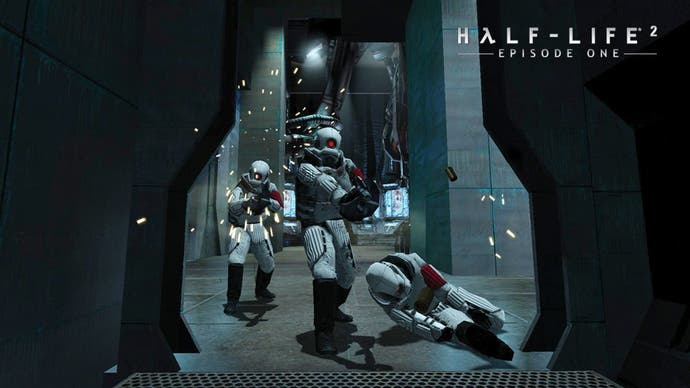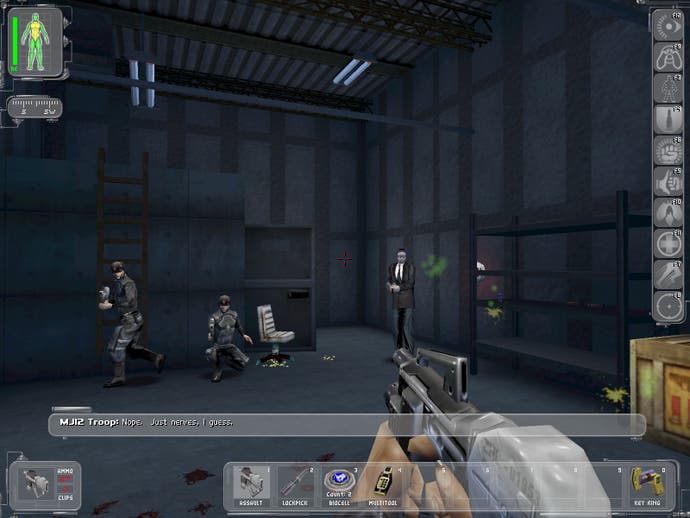Warren Spector on game development
Part 2: On 'less enjoyable paths' and reaching a wider audience.
Following yesterday's unedifying spectacle, we return for another round of Warren Spector's thoughts on game development. Obviously we jest. It's all about edification. If I had a biro for every time I've been edified by Gabe Newell and Warren Spector over the last month, I'd be able to doodle my way through every editorial meeting for the next 50 years even when none of them worked. Seriously. It's edification city and these two are a coalition administration, lowering my imagination taxes one headcrab or convincing shadow at a time. All of which horrendous metaphorical gibberish should suffice for an introduction. And read part one of the interview if you haven't already.
I don't think it'll surprise anyone that I like text in games but I recognise that a lot of players don't. The fundamental experience of videogames is, and should be, seeing, listening and doing, but there's certainly a place for a certain amount of optional text.
The key for me is to give as many players as possible as many ways to get into your game as you can. If players want to ignore text, they should be able to. Heck, if players want to be able to bypass combat, let 'em.

First, let's give huge props to Valve - its efforts toward creating better, more believable virtual actors are pretty incredible.
Okay, now that we've gotten that out of the way, it's important to consider the function of AI in a game - it isn't to kill players or help players or anything more (or less) than to challenge the player sufficiently in support of whatever game experience you're trying to create. In a shooter, the role of AI isn't to kill the player but to leave the player breathless and shaky, with one hit point left and one bullet left in his or her gun. In a game about real human interaction (without guns) the role of AI would be radically different.
To your specific points (characters getting out of your way and having believable ammo loadouts), those are all either design decisions - we can do better - or technical problems we can certainly solve.
Sadly, once we move beyond that, I think we're a ways off from "real human interaction". For my money, it's time we started tackling the non-combat AI problem in as serious a way as we tackle rendering engines and physics simulations. But it's going to be a while before we figure out how to talk to an NPC in any believable way or how to craft a sufficiently reactive character that we believe in them and care about their fate. Valve's approach seems promising but kind of hinges on non-interactive scenes in which NPCs emote for the player. And Bioware may be onto something with what it is doing in Mass Effect. But, honestly, we're still crawling like infants when it comes to human characters and that isn't likely to change any time soon.
Stop asking questions that can only be answered at book length! Not fair! The short (very short) answer is that you do have to be satisfied with an illusion. Then you have to provide a clear, simple visual/aural language that cues players to the available options and the likely behaviour of the world and NPCs when you select one option over another. Finally, you have to provide clear and immediate feedback on the results of each choice the player makes.
Oh, and you have to (at least I think you have to) slow things down enough that players can pause, consider the situation, make a plan and execute that plan. If everything's moving at breakneck speed (like most games these days) you better not expect players to be making many choices - at least not choices that have any serious consequences! The amount of data players can process and act on seems to be inversely proportional to the rate at which that data is being thrown at them. One of the Valve guys recently told me you can't expect a player in combat to register more than a word or two - a sharp command. Anything more than that just gets tuned out. Totally true.

The obvious answer is that you don't want to ship a game that has "less enjoyable paths". In the real world, that ideal is unattainable but you just test and test and test (and tweak and tweak and tweak) to minimise the likelihood of that happening.
When we were working on Deus Ex, I used to have nightmares that players wouldn't "get" what we were trying to do - that they'd judge our combat against Half-Life's, and find us wanting, judge our stealth against Thief's, and find us wanting, judge our character development and role-playing elements against whatever Bioware was shipping when we shipped, and find us wanting. But I knew (or felt) that, if players "got" that you could play however they wanted, at any point in the game, they'd forgive us our shortcomings.
I mean, it gets down to what your goals are. If you're a surgeon, you want a scalpel; if you're stranded on a desert island, you probably want a swiss army knife. DX was the swiss army knife to Half-Life's scalpel. I was, and am, comfortable with that.
As far as "missing out on cool stuff" goes, I'll return to my earlier argument - if every player sees every bit of "cool stuff" you might as well make a movie. If what you're after is unique player experience, my way's the right choice.
Man, I wish I liked MMOs and online gaming more than I do. I guess I'm an antisocial guy and prefer the single-player experience. But, accepting that I'm an anomaly, there's clearly a growing audience of people who want to work together, virtually, to accomplish game goals.
I wish I could say this was shaping my thinking about games but, really, I'm not yet clear how to apply co-op gaming to my own work. I've wrestled with small-group co-op possibilities for years and still haven't figured out how to make them work. Oh, in the context of a very simple, visceral, physical conflict, it's easy to see how two or four or 42 people might co-operate to kill The Bad Guy. But once you start messing around with more sophisticated storylines, the co-op problem becomes much harder.
Frankly, if I keep flailing around trying to answer this question we'll be here all day and probably not get any closer to an answer. So I'll just stop here and admit defeat. Someday someone I'm working with will prove way smarter than me and nail the co-op storytelling problem(s) and then I'll be able to sleep at night again...

